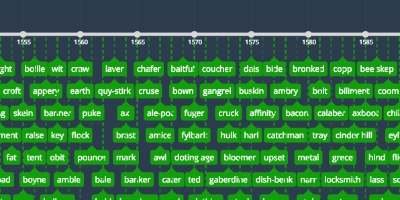jan 1, 1538 - barker
Description:
In the northern counties the ‘barker’ was the man who stripped the bark from oak trees for the tanner and by association the term then came to be applied to the tanner himself. As a by-name it is on record from the twelfth century and it became a popular surname. Early examples include 1301 John <i>le Barker</i> of Snape and Ralph <i>le Barker</i> of Bedale (YRS21/101-2). Independent references to the occupation are recorded from the same century: 1379 <i>William Cook, barker,</i> of Flockton (PTWR); 1501 <i>Robert Kettlewell, barker </i>of Ripon (YRS102/102). An account roll for Whitby Abbey illustrates the dual role with the following entries: 1395 <i>De Willelmo Barker, pro bark sibi vend’o in les Holmes 6s 8d; Pro pellibus animalium venditis Will. Barker</i> (SS72/564-5). In 1538 it was ordered at the manor court of Wakefield that <i>no barker by any heir </i>[buy any hair]<i> of his nebor</i> – the reason being that clothiers were blending it with wool to make a cloth <i>callyd pawmpillzon</i> (WCR9/86). The work of the tanner certainly overlapped with that of the barker but a distinction between the two is explicit in a deposition of 1691 in which a man called George Harrison said that he earned <i>9d a day all this barke time, for chopping of barke, besides working of the tanner traid </i>(NRQS9/8).Added to timeline:
Date:
jan 1, 1538
Now
~ 487 years ago
